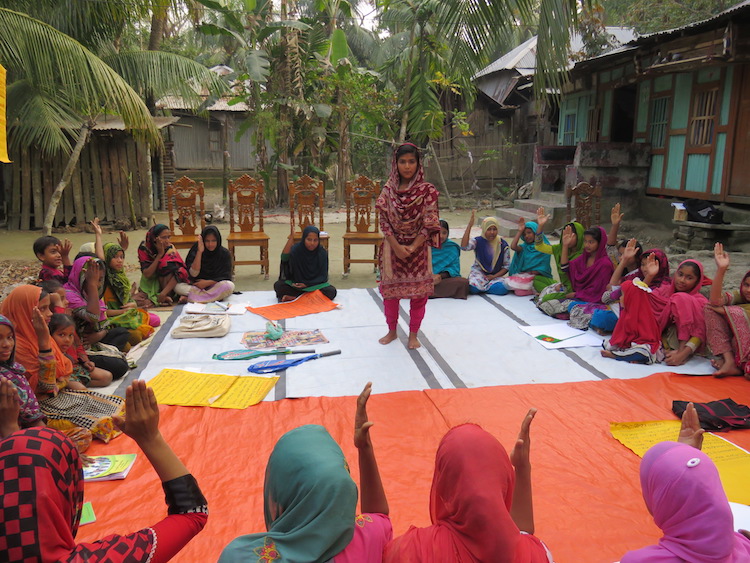By Naimul Haq
BHOLA, Bangladesh (IDN) – In Bangladesh, as in many other parts of the developing world, the barbaric practice of underage marriage is still widespread.
Now, in what Human Rights Watch (HRW) has called a “devastating step backward for the fight against child marriage”, the Bangladesh government has approved a controversial provision allowing child marriages under “special circumstances”.
The ‘Child Marriage Restraint Bill 2017’, passed on February 27, defines any marriage involving one or both parties below the legal age (21 for boys and 18 for girls) as ‘child marriage’, and recognises that girls under the age of 18 can be married off with permission from their parents and a court in undefined special circumstances, without specifying a minimum age.
Among others, the law effectively rewards a rapist by allowing him to marry his underage victim without facing any legal charges
Human rights experts and women activists argue that the new law will neither benefit nor improve the current situation but reverse the achievements of years of struggle to challenge child marriages.
More than half of the girls in Bangladesh are married before the legal age of 18, according to the International Centre for Research on Women (ICRW), and many communities still view early marriage as a practical way to ensure economic security for young women, and avoid the potential scandal of sexual relations outside marriage.
Nevertheless, the challenge of confronting child marriage is gradually being put to test through some practical learning approaches adopted by adolescents who are the potential victims of this practice.
Fourteen-year-old Farzana Aktar, from a neighbourhood in Shibpur in Bhola district, 250 km south of the Bangladesh capital Dhaka, is one of many young girls vowing to defy tradition and end the practice.
“I don’t want to be a victim of child marriage and we are ready to end the tradition,” she says confidently as she stands in the middle of about 30 young girls –calling themselves the Jamuna Kishori Club – and reads out messages highlighted on a poster condemning underage marriage as a violation of human rights.
“The evil must go,” says Bibi Fatema, another young student. “Child marriage is a curse and traditionally parents wish to be freed of their responsibilities by offering an underage bride. In fact, by forcing a child bride, parents step into a dark era.”
For 15-year-old Maimuna Aktar, one of the group members, “parents and community leaders are well aware of the consequences of early marriage yet they push us into the horrors of physical and mental violence.”
Shoshi Aktar, 24, a senior staff member of the Coastal Association for Social Transformation Trust (COAST) – a leading NGO working for the sustainable and equitable improvement of life, especially of women, children and disadvantaged population of the coastal areas in Bangladesh – is engaged in awareness raising to prevent child marriage in Bhola.
“Child brides face huge sufferings,” she says. “Isolated, often with their freedom curtailed, young brides frequently feel disempowered and are deprived of their fundamental rights to health, education and safety.”
Sufia Begum, a member of one of the groups of adolescents participating in the project which organises regular ‘self tutorials’, says that the “self tutorial is a package of knowledge-based education which aims to empower adolescent boys and girls. The essence of once a week meeting in groups is to unite and support one another in the learning process.”
According to Reshma Akter, a coordinator of the ECM project in Bhola, which has the one of the highest rates of child marriage in the country (37.4%), “we strongly believe that the focus on these vulnerable groups of adolescents will gradually end child marriage because continuing education, particularly for girls, is a major factor for ECM.”
A vulnerability study conducted among female students of 123 secondary schools in the district found that 2701 of the students (13.19%) are now at risk of child marriage and dropping out of school.
One of the unique aspects of the ECM project is a stipend programme for school drop-out adolescents who are vulnerable to the violence of child marriage.
Sharmin, daughter of a day labourer, who had dropped out of school, was admitted under the ECM project to the stipend programme and is now pursuing her education in a secondary school in Bhola. “I received the stipend because I pledged to continue my education and also not to be married before the age of 18,” she says.
Ferdous Ara Rumee, COAST’s Assistant Director for Gender and Training, said that the stipend programme has been a very successful initiative. “Families who once faced difficulties in sending their children to schools due to financial crisis, now show tremendous enthusiasm in continuing education for their children and the biggest gain from implementing the programme is that the communities are themselves identifying school dropout students.”
Rumee, who is also a leading women’s activist, was highly critical of the new child marriage law. “By the allowing a rape victim to be married to a rapist we are, in fact, legalising rape,” she said. “It is a shame that we fail to understand the values of women’s participation in the society and that we continue to discriminate women and violate their rights.”
Commenting on girls giving up education under pressure from their families, UNICEF Representative in Bangladesh Edouard Beigbeder said: “UNICEF strongly believes that access to quality education for girls, especially completion of secondary and tertiary level education and access to vocational training and non-formal education that include those girls who have dropped out of schools or have not completed formal education for different reasons, will allow girls to have livelihood opportunities.” [IDN-InDepthNews – 21 April 2017]
Photos: (1) Shoshi, peer leader in her community exchanges information views on child marriage during a courtyard meeting of the adolescent group in her neighborhood. (2) Some regular schoolgirls who vow to end child marriage in Bhola district. Credit: Naimul Haq | IDN-INPS
IDN is flagship agency of the International Press Syndicate
facebook.com/IDN.GoingDeeper – twitter.com/InDepthNews

